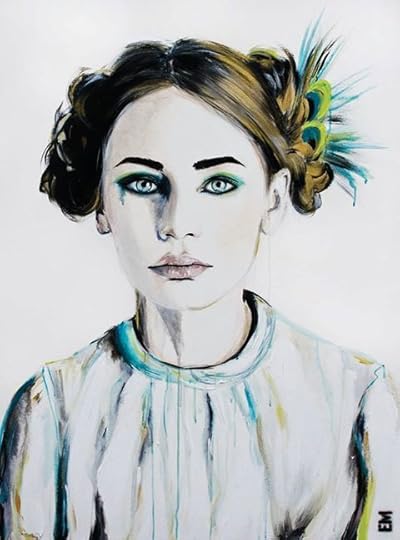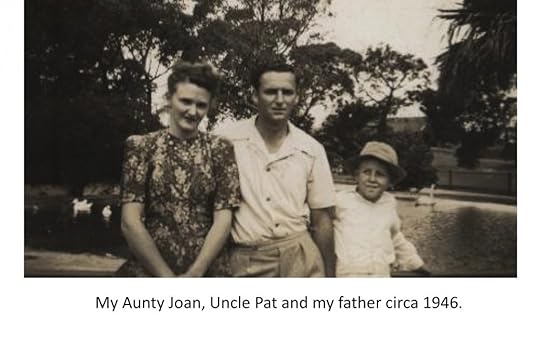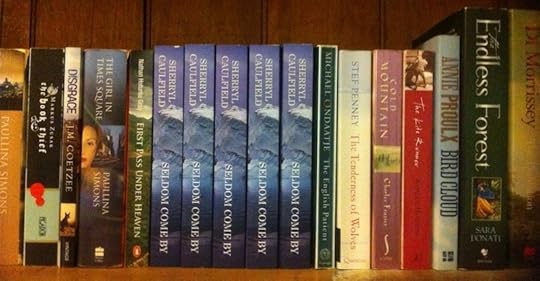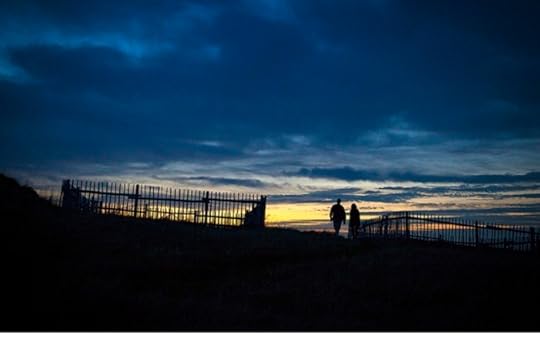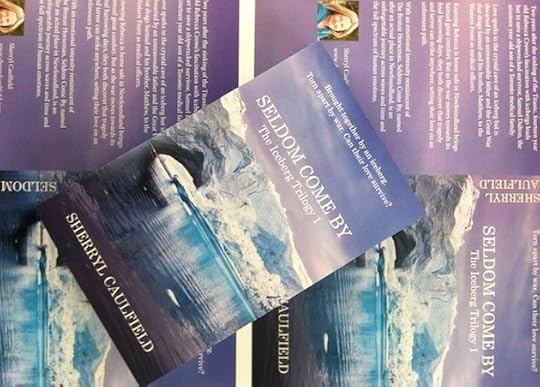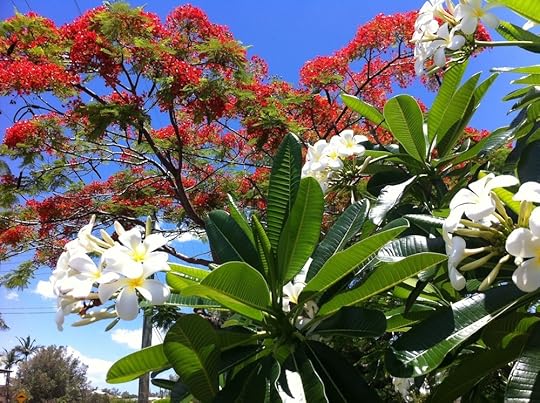Sherryl Caulfield's Blog, page 4
January 18, 2014
Bellagrand – Not quite as beautiful or as grand as The Bronze Horseman
The Bronze Horseman by Russian born, American author, Paullina Simons is my favourite teenage love story; the trilogy, one of my favourite series of all times. And so it was in late 2012 when a prequel was released telling how Alexander Barrington’s parents met and fell in love in Boston in the early 20th century the book could have been called Great Expectations, such was the antipation for this novel.
I carved out a few days to read Children of Liberty and then afterwards I was in a total slump, not because I had a book hang-over but because I had a book blah. Despite the wonderful prose, I could not feel the love between the main characters. I could not understand the attraction. I could not put fingers to keyboard to write about it. So I picked up other books, continued with my own writing, while I waited and hoped that the next one would move me like her other breathtaking books.
I’m pleased to say Bellagrand has – but not for the reasons you might expect. And even though this book did not make me fall in love with Gina and Harry, even though it did not break my heart over them it certainly made me FEEL – which for me is paramount – and what I felt most was the heartbreak of a lone sister. Esther.
It was interesting how that came about. The story is largely told from Gina’s point of view, with only the briefest snippets from Alexander’s as bookends and just a sliver of Esther’s. But that was all it took. In a café in Casuarina, heavy tears coursed down my cheeks as I read her last agonising conversation with her nephew, Alexander.
If you have read The Bronze Horseman you will understand everything. If you have not, then I’m not sure how much you will enjoy this book. Earlier this week I spoke to a friend, also a TBH fan, who was half way through Bellagrand. Her words: ‘Man it’s depressing. Does it get any better? I know they have to go through all this stuff to get to Russia but sheesh!’
That’s it in a nushell. If you haven’t read Bellagrand and want to, then leave this page now. Shoo! Go!
If you have read Bellagrand, please tell me what you thought. I’d love to hear and chat. Here’s my in-depth, spoiler-filled summation.
There was many a time when I was reading Bellagrand when I wanted it to be about a different Gina from Sicily and a different Barrington boy from Boston – not one destined for the depressing, dire mire that was Russia in the 1930s. The reason for this: Gina’s husband, Alexander’s father, Harry, was such a selfish, deceitful character that I wanted to punch his lights out on so many occasions and throw my book at the wall. One of the major downsides – I have since discovered – to having an eReader.
In the opening chapters when we discover that Gina has supported Harry for seven years – seven years! – while they lived in her mother’s meagre home in Lawrence, while he fluffed about ideologising and doing God knows what, I found myself struggling to relate to this woman and this man. I could not relate to how that situation had not worn her down into a resentful, loveless woman who had little, if any, respect for her husband. I could not understand how Harry did not feel the tiniest bit emasculated by their situation, emasculated enough to get off his posterior so his wife did not have to work so tirelessly at three jobs.
The story started to get interesting when Gina falls pregnant for the first time, only to miscarry her baby due to being caught in an industrial riot. At which point Harry finallly finds his caring, protective muscle in a backhanded sort of way – telling her: “I told you to stay away.”
There are lots of political, union and socialist discussions as well as current event updates throughout the novel that I waded through at times. I understand why they were there. I understand what those people were fighting for and how their struggle has meant better working conditions for almost everyone I know. [Yet sadly, is a struggle still taking place right now in many countries like Cambodia.] I understand how these were core to Harry’s beliefs and dreams for a new world order but I found them a bit dragging. That said, as an Australian who has not studied 20th century American history, the story did send me googling people, places and events and I think how these figures, such as Big Bill Haywood and Anna LoPizzo, were woven into the story was commendable. I just would have preferred less.
Respite comes when Harry is serving one of his longer jail terms and his best friend, Ben, returns from a decade in Panama where he has been building the ground-breaking (pun intended) canal. And in that disheartened world that Gina is living, she finds a new Eden, and Ben’s unrequited feelings for this once-spirited Sicilian beauty become no longer unrequited. Oh, the vicarious thrill of their Christmas lights and their iceskating lake and and their sleepless Saturday nights. Finally, someone who really cherishes her! What I wouldn’t have given to be inside Ben’s head and to read what this must have been like to pine after a woman for 15 years before finally consummating that relationship. Ever since the early days of Children of Liberty when we first met Ben I’ve found him to be the more spirited, interesting character with visionary ideas of his own that were life affirming and exotic.
However in the limbo of their bliss Harry is released from prison and Gina decides to return to him.
“He gave up everything to marry me,” she tells Ben.
“Maybe he didn’t value what he had,” Ben said cooly, “Did you ever think of that? Does he value you?”
Exactly. Ben saw it all.
Harry loved his ideals more than he loved Gina – despite his words arguing to the contrary. And argue they did, not about Harry’s beliefs as much as his irresponsibility, until one brief pause when they make love and their flailing union renders Gina pregnant for the seventh time, as the Spanish Flu arrives and does its best to assail her and half the people around her.
Being ill, unable to work, with Harry back in jail, and anxious of losing her baby, Gina does what Harry has been unable to do. She drags herself out of her sickbed and trains to Barrington to beg for help, for Harry’s baby. Miraculously, the Barringtons do not turn her out. Hermann even admires her. And, despite everything, Esther finds a common cause to side with Gina: new life, a child that she could never bear herself. And, bizarrely, there is clemency for Harry in exchange for house detention in a grand house in Florida bequeathed to him by his mother, which was bequeathed to her by none other than a flamboyant discarding lover.
Bellagrand, their mansion by the sea.
One of the hallmark’s of Paullina’s writing that I adore is her lyrical alliteration. We saw it in The Bronze Horseman: Luga, Ladoga, Leningrad, Lazarevo. And in this one too: Belagrand, Belpasso, Boston, Ben.
Bellagrand: their short-lived, sedate version of the roaring twenties; their overdue Lazarevo. And as a curtain raiser, Harry’s lovesick letter to Gina penned before they even married. Now we are finally reading how he truly felt for her way back when.
“I want nothing in my life as much as you…You are the muse to my every insipid utterance.”
I get why Harry loved her. I just wanted to hear him tell us why. He loved her because she was unique, like Susan Sarandon walking down the street. She was his angel who kept house, cooked divine meals, provided for them and was a sex goddess at night. Yet, did he love her enough?
What did she see in him? I kept on searching the pages for the answers. I rationalised that she loved him because he was a passionate and original thinker, highly intelligent, her partner in repartee. She loved his sacrifice, what he gave up for her, she loved that he loved her and, it would appear, that he was a good lover, he certainly made her hit the higher octaves. And I think she loved him because he still had a father, like she had once had a father whom she adored, and what she longed for was the perfect family of three generations of men together.
Certainly Hermann’s coming to Bellagrand was monumental, the happiest of times – aside from the infuriating conversations with Harry, like the widget one where Harry could not concede a single valid opposing point.
But too soon afterwards Hermann dies in Boston and Harry does not attend the funeral. Gina goes as their sole representative. And during the wake, which Ben attends with his new Panamanian wife, Esther at long last perceives Gina and Ben’s secret affair. That night, Esther accuses her sister-in-law of thrice ruining any chance of happiness she could have had with Ben, despite her affections being unreturned. Esther understood exactly what had happened each time, but she did not understand Gina’s motivations, falsely accusing her of being manipulative and plunderous, all the while Gina sat stone-faced, unable to defend herself without incriminating herself.
Gina returns south, to the magnificent comfortable, carefree life she enjoys with her husband and son, except with Harry’s release from house arrest, he wants out. “I want to go back to Boston – to be closer to Esther – she’s the only family I’ve got!”
True, true true, but lies, lies lies. And what about Gina’s brother, Salvo, who had moved across country for them?
I hated Harry’s deceipt, his lies by omission. Back in Boston I wanted Harry to be trampled in some union riot. I wanted Ben’s innocent wife to be caught up in some Panamanian landslide so Gina and Ben could be united and Alexander would still have a ‘father’ to look up to, a builder and engineer extraordinaire.
Because from thereon their life in Boston starts to dissipate and fracture as Harry’s appalling deceptions slowly surface. It really goes down the sewer and there are a few minor details in this section that don’t entirely synch with The Bronze Horseman series – their citizenship situation being the case in point which really is the penultimate punch in the gut.
“She was too proud to let him see the heartbreak in her humbled spine.”
As we near the novel’s end Gina makes the irreversible decision to stick with Harry and go to Russia with him and for me it was like the end of the movie Breaking the Waves. In this film, Bess, a young, simple woman (played by a young Emily Watson), returns to a masochistic, torturous sex house – all to please her husband. She ventures into her own death – as does Gina.
At this point I wanted to slap Gina. I wanted to lock Harry far far away on that island in Russia – the one they kept on talking about.
But what did Gina do? She went to bed with him in the middle of the day – sorry? – what? – that noise you are hearing is the needle scratching across the record.
“Unfed, unquenched, unresolved, Harry and Gina undressed and in bed tried to feed and quench and resolve themselves. They always had that to fall back on, the white rumpled sheets of their mutual ardor.”
I could not get my head round that. Not the day time sex, but the anytime sex. I don’t know how she lay down with him ever again.
Esther had said earlier: “Your charms didn’t work on my brother.” But his obviously worked on her, and still I could not see it…was it just his whispering to her in Italian? Did she put up with all his crap for that?!
Bellagrand is Gina’s story… We never get inside Harry’s head enough to love him. In The Bronze Horseman we were inside Alexander’s head at various points and those were powerful – Shura washing the blood off Tatiana at Luga, his arrival in Lazarevo, his chats with Dimitri. And then there was The Bridge to Holy Cross. In this book there are no sections that I recall from Harry’s point of view and I think perhaps this was a deliberate move so we were always closer to Gina, always on her side.
For me the most powerful scenes in the book were Esther’s: her venting after her father’s funeral; her plea to Harry and Gina not to leave America, begging for Gina to stay behind with Alexander. Breathtaking!
“Gina I’ve reconsidered all my previous positions. Imagine what a shifting of the sands this is for me. Please forget everything hurtful or hostile I’ve ever said to you, and forgive me. But please – don’t do this. Your son is your ladder to the stars. He deserves better than this.”
(Your son is your ladder to the stars = my favourite line of the entire book!)
Her silent plea to her brother:
You are the only family I have left. You, your wife, my beloved boy. Once you leave, I will have nothing. You’re going to a dreadful place, yes, but your also leaving me and that feels so wrong. How can you not understand that? Do I have to even say it? She didn’t. She couldn’t.
And her final conversation with Alexander in the park across the road:
“Thou shalt not be afraid for the terror by night, nor for the arrow that flieth by day, nor for the pestilence that walketh in darkness, nor for the destruction that wasteth by noonday, a thousand shall fall at your side, and ten thousand at your right hand, but it shall not come near thee.”
Heartbreaking! At least we know he memorised it like she asked him to. Bittersweet. I would have liked to have seen more of just Alexander and Esther.
Even though the last few chapters build to an absorbing climax Bellagrand is not an uplifting story and, I admit, I like a happy ending, or at least an ending that has some degree of implied hope and promise. And I also like my antagonists to redeem themselves in some way.
So although I did not love this book – I did love a lot of the secondary characters and Gina too for most of the time. I hated her agreeing to go to Russia. Yet without that, there would be no Bronze Horseman. Such a bind. Ultimately, I think Bellagrand made me love the TBH series and Alexander even more, because of his mother’s sacrifice. I’m glad he got to live the American dream, because for his rudderless mother it was tragically too short.
The post Bellagrand – Not quite as beautiful or as grand as The Bronze Horseman appeared first on Sherryl Caulfield.
January 7, 2014
Artists Come Alive in Set Me Free
Above painting and thumbnail by Brisbane artist, Emma Sheldrake
I have always been enthralled with art – in fact drawings, sculptures, paintings and poetry feature prominently throughout my novel, Seldom Come By, and there’s more to come in The Iceberg Trilogy!
And so it was that while reading Set Me Free, the story of a young female art gallery owner in Brisbane’s West End fighting a determined and suave property developer, I was also devouring Beautiful Bizarre Magazine’s December issue and came across the striking portraits of Brisbane artist, Emma Sheldrake. And before I knew it, the three became entwined, which made for an enchanting read.
In Set Me Free, Brisbane author Jennifer Collin‘s debut novel, we meet Charlotte Evans who some years earlier moved from Melbourne to Brisbane to manage an art gallery to champion her younger sister, Emily, and other local artists. Emily’s paintings tend to be muted cityscapes that have a singular bright focal object – a bike, an umbrella, a geranium pot plant – that draws your eyes in. Emma’s artwork is the opposite, but equally magnetic: stylised colourful portraits yet with pale faces that lure you in due to the intensity of the model’s eyes. (See image above whose eyes incidentally remind me of my heroine’s Rebecca’s)
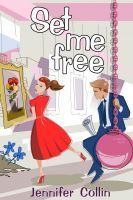 The book opens with Charlotte returning from a holiday in Italy and on her first jetlagged night home has – what she hopes will not be – a one night stand with a man who comes into her art gallery just before closing.
The book opens with Charlotte returning from a holiday in Italy and on her first jetlagged night home has – what she hopes will not be – a one night stand with a man who comes into her art gallery just before closing.
The next day she discovers through her best friend, Ben, and Emily that a developer has bought the strip of buildings which houses her gallery, Ben’s coffee shop and their favourite Vietnamese restaurant and intends to tear the lot down to put up a soulless homogenous shopping cum residential block. And the developer in question is none other than Craig Carmichael: one night her ardent lover, the next her guilty, standoffish, silver-tongued enemy. Charlotte’s cringing and regret were palpable and quite a poignant lesson for us all. Would that she had prescience!
Setting this story up so the main characters were intimate before their conflict made for an interesting twist on this developer versus local community narrative which has also been covered by Australian authors, Helene Young, in Halfmoon Bay, and Di Morrissey, in The Plantation, in recent years.
Charlotte also had a penchant for dancing, ala Dancing with The Stars style, and a love of all things 50s including her wardrobe. Who doesn’t love those fashions? A girlfriend, Andrea, who recently shared this pic said: “I wish I lived in the 50s instead of being about to enter my 50s.”
This was a light, easy read that will dovetail nicely into the sequel which I suspect will focus on Emily’s romance. If you like your local art scene and chick lit romances, give this book a go.
The post Artists Come Alive in Set Me Free appeared first on Sherryl Caulfield.
A Modern Country Girl’s Teenage Yearning
When I wrote about my Aunty Joan recently I mentioned reading Michelle D Argyle’s coming of age novel, Out of Tune. I confess I don’t read much in the YA genre – the Twilight series comes to mind but that was also paranormal, however I completely related to the heroine’s creative dreams and desire to pursue them.
Out of Tune took me inside the world of American country music seen through the eyes of a young woman at a crossroads in her life. Twenty year old Maggie Roads has spent years touring the circuit, living under her parents shadow, depressed by her inability to sustain a song, yet so desperately wanting for music to be front and centre of her life. And into that turmoil comes more hurdles and setbacks and temptations and the realisation that her parents could have been considerably more supportive.
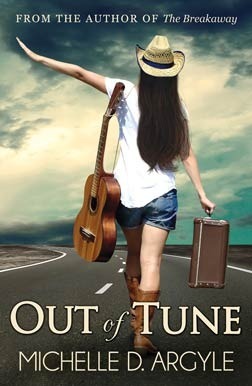 What I loved about this book is the original storyline and the surprises that kept on coming. I had no idea how the love triangle was going to work itself out – I still would like to read more anon on this Michelle – if you are reading this .
What I loved about this book is the original storyline and the surprises that kept on coming. I had no idea how the love triangle was going to work itself out – I still would like to read more anon on this Michelle – if you are reading this .
But ultimately this is a story about a very modern girl who could have made some bad choices for herself but didn’t. The way she was her own best-friend, honest and considered rather than inpulsive and regretful was a wonderful example for others who might be tempted to dive into relationships, ignoring all the waming bells and confusion of their heart. And through testing the waters and being honest with herself, she found her true north along with her true love.
“Nathan you can call me Mags” – just love the acceptance of this line.
And wouldn’t you know it, when I headed south for my Aunty’s funeral last week, on the outskirts of Tamworth, Australia’s country music capital, was the above billboard. Michelle said it took a week to dye her hair!
The post A Modern Country Girl’s Teenage Yearning appeared first on Sherryl Caulfield.
January 5, 2014
An Epic Alaskan Adventure
Tomorrow, a friend of ours – a Noosa lad no less – will attempt the first winter crossing of the Brookes Ranges in artic Alaska.
In 2012, after four failed attempts and six years of trying, at 27 years of age, John Cantor, set the record for the fastest traverse of the Brooks range, a 1,600km expedition across the wild and barren northern tundra considered one of the toughest solo expeditions on earth. Last year, I had the privilege of reviewing and providing editorial assistance on his first book that recounts his historic summer journey. It’s a fast read (not unlike Touching the Void) and I’m sure he will land a publishing contract for that in the not too distant future.
But meantime he has an epic and icy adventure to contend with, though fortunately this time he is not alone. A friend, Evan Howard, will be joining him in that punishing cold.
Aside from his extraordinary acommplishments in adventure, I salute John for being an ambassador for Beyond Blue and for speaking out about his battles with anxiety and depression.
Pop over to his Facebook page and wish him well.
https://www.facebook.com/JohnCantorAdventurer
The post An Epic Alaskan Adventure appeared first on Sherryl Caulfield.
December 28, 2013
An Ode to my Aunt
I am not long finished Michelle D Argyle’s heartfelt coming of age, country music romance, Out of Tune, when I find myself about to journey to Australia’s country music capital. Sadly, this trip to Tamworth is not for the Australian Country Music Awards, but for the funeral of my father’s much-loved, much-older sister, Joan.
My aunty was born in the heart of winter in June 1924 when her mother, my Grandma Jessie, was just 20, and her father, my Grandpa Bill, was just shy of 21.
They lived in the gold-town of Gympie where my Grandpa at the time worked for the local shire council as a navvy – a manual labourer who worked on major civil engineering projects. His job was to dig road banks by hand using a crowbar, mallet and other tools – it was hard physical labour, more so because he would work on the steeper slopes so he could earn extra money for his new family.
At the time of Joan’s birth he was working on The Bruce Highway and camping at Gunalda, 20 miles north of Gympie. In what would seem preposterous today, he walked 20 miles in to town to the hospital to see his young wife and new-born daughter then walked 20 miles back to work the next day.
At age fourteen my aunty left school to look after her mother who was heavily pregnant with her third child, my father. In this we are kindred spirits for we both had the joy and privilege of having a much younger brother to bless our lives, my own brother Jesse being 16 years my junior.
In early 1942, during WWII, Joan met and fell in love with a soldier from Urana who came through Gympie with the Light Horse Brigade. Shortly after, Pat was posted to Labuan Island in the Sumatra Straits near Borneo, in the Pacific (now part of Kinabalu), where he worked a signalman from July 1942 until he was discharged in June 1946. Despite V-day in the Pacific being declared in September 1945, much to his disappointment, Pat was ordered to remain on active duty patrolling the Pacific for another nine months. When I think of Neville Shute’s A Town Like Alice, I think of Uncle Pat. He was your archetypal Aussie battler and larrikan, a swarthy smoker and joker.
In August 1946, upon his eager return to Gympie, he and Aunty Joan married. They moved to Sydney and later Tamworth where they raised five sons who were talented musicians, electricians, bankers and card players.
Yesterday when my father rang to tell me his sister had passed away, he said to me: “She never said a harsh word to me. Her whole life she was nothing more than a loving sister.” Everything I knew of her confirmed that. Her voice was light and catchy. Her laugh cheery and close to the surface. Her eyes were brown and warm. Her hands were forever full of love. She would always bring a little bit of my grandparents with her and draw out a side of my father reserved solely for her.
Last night I watched the movie, Pay it Forward. As the end credits rolled and the candles flickered, as Jane Sibery & KD Lang sang Calling All Angels, I thought of my Aunty Joan being serenaded by angels.
With thanks to my father for his input into this article.
The post An Ode to my Aunt appeared first on Sherryl Caulfield.
December 12, 2013
Seldom Come By a read like this
Dec 12, 2013: Brisbane author, Sherryl Caulfield’s debut novel – Seldom Come By – released today – is a confronting coming of age story set in Newfoundland and the Western Front during the First World War.
On the eve of the 100 year anniversary of the start of World War 1, Seldom Come By takes readers to a remote Newfoundland island where, two years after the sinking of the Titanic, young Rebecca’s Crowe’s fascination with icebergs leads her to save shipwreck survivor, Samuel Dalton, the youngest son of a Toronto medical family. Raised in a deeply superstitious and religious family, Rebecca’s life is challenged irrevocably through her growing attachment to Samuel and their unforgettable, iceberg-inspired summer.
The 165 000 word tome, Book 1 of the Iceberg Trilogy, is now available through major ebook retailers in time for Christmas and holiday reading, promises readers an epic novel of immense visual splendour and palpable human emotions.
At a time when commercial fiction is full of paranormal fantasies, upper-class Regency and Victorian liaisons or voyeuristic erotic romances, Seldom Come By is anchored in realism in a period when life was less pretentious though paradoxically, harder and simpler, said Ms Caulfield. “It is an epic adventurous love story in the classical sense, which will appeal to serial readers of The Bronze Horseman, Into the Wilderness and Outlander novels due to its storyline of young love, longing and sacrifice.
‘Rebecca’s story is universal and timeless. She could be any woman who feels trapped in her surroundings and longs to experience more of the world and through the choices she makes has to live with the devastating consequences of her actions. This novel is not just about love. It’s about the great themes of life, about shocking crimes that are possibly the hardest to forgive – ones committed by family members against other family members.
Ms Caulfield has travelled extensively in Canada and was inspired to set her novel in Newfoundland because of its isolation and promixity to Iceberg Alley. “Icebergs are a strong symbolic element in the novel, representing something magical, a sign of lightness in darkness, a sign of hope and endless possibilities,” she said.
Through the eyes of two young Canadian medical officers, Seldom Come By also brings to light many of the chilling aspects of World War 1: the decimation of the Newfoundland regiment, who previously were active with the ANZACs at Gallipolli; the major Canadian battles of WWI; and the bombing in May 1918 of Hospital City by the Germans in the desperate last months of the war, killing and maiming doctors, nurses and patients. It also features John McCrae, revered Canadian surgeon, university professor and author of the iconic poem, In Flanders Fields.
“I wanted to set my story against the backdrop of this harrowing time and in part the connection to World War 1 is because of a Great Uncle who died at Ypres in 1917,” said Ms Caulfield. “War heightens everything. People have far less time for pretenses – life, love and death are so elemental and this is what drives the narrative pulse of the book. Plus, with the 100th anniversary of the start of World War One fast approaching, I thought there would be strong interest in books set in this period featuring characters that are modern and adventurous in their own way for that time. And while male cameraderie and loyalty are hallmarks of war, Seldom Come By takes this code of honour to another level through the bond of two brothers working side by side.”
Julie Fison, author of teenage romances in the Hardie Grant ’Smitten’ series, said she found the setting of Seldom Come By enthralling. ‘Seldom Come By is a haunting love story set against the windswept coast of Newfoundland. The story draws you in from the opening lines and takes you on a compelling journey across time and continents, through love, loss, heartache and healing. It is a beautiful and memorable story — a great accomplishment and a wonderful read.
The book is available as an ebook from major ebook retailers including Smashwords and a print version will be available through CreateSpace and Amazon. Details on www.sherrylcaulfield.com.
~ ENDS ~
Issued by Action Communications on behalf of Sherryl Caulfield
For Review copies, a synopsis and additional media information or to arrange an interview please contact:
Anita Beasley, Action Communications. Email: anita@actioncommunications.com.au
The post Seldom Come By a read like this appeared first on Sherryl Caulfield.
December 9, 2013
Two sisters, one stranger
Imagine you are a teenage girl living in a very remote place and you only have one sibling, a sister, who is also your best friend. And then into your banal life comes a stranger with a smile like no other, with tales of adventures you can’t get enough of, and a way about him that is just breathtaking. You and your older sister are both captivated. What do you do?
This the beginning of Seldom Come By. My first draft was pushing 230,000 words – way too many – and so to improve pacing I cut the point of view of different characters and in lots of places reduced two pages into one paragraph. One such section explored Rachel and Rebecca’s growing feelings for Samuel. You can read it below. (Also thanks to Newfoundland and Labrador Tourism for the above photograph.)
The summer of her fifteenth year was a summer of many firsts for Rebecca. And for Rachel and Samuel too. In what was undoubtedly the busiest time of the year, the presence of Samuel buoyed and energised Rachel and Rebecca like nothing else. Neither girl had ever spent such time in the presence of a man so clearly different from the one they knew so well. Without even trying, Samuel was warm, friendly and helpful. He was easy to be with – never solemn or withdrawn or grumpy. He was just himself. And at times himself was extremely playful.
Throughout these long summer days, Morna’s ‘keep them busy, keep them apart’ stance had mellowed into a ‘keep them together; there’s safety in numbers’ approach. After all, two’s company, three’s a crowd. But even she in the end was swayed by her growing ease with Samuel, her faith and her belief that his gratefulness towards them would prevent him from doing anything to upset them.
Besides who had time for mischief? That year Newfoundland was a summer wonderland and it did not disappoint with its ample abundance. The earth, the sea and the sky were laden with nature’s bounty And to add to their haul, care packages had started to arrive for Samuel from his mother and brother after he had written advising of his intention to bide out the summer with the Crowes.
Her father had spent a Saturday showing Samuel how to work some of his seldom-used lobster pots so Samuel could bait and check them every day or two in his absence. Rachel had taught him the fine art of jigging for squid in between cooking meals and preparing the smokehouse. Smoked fish made a pleasant change to the salted variety they got from the Deception Coop as part of Silas’s haul. Meanwhile Rebecca and her mother had single-handedly prepared a hay field so they could harvest at the end of the season to feed their stock over winter.
In the midst of their growing friendship with Samuel, neither girl would give voice to the fluttering of her own heart. For Rachel delighted in Samuel’s company. She became more relaxed and flowing and for the first time in her life felt like a woman, ready to be a w[image error]oman. She would lie in bed at night thinking of his bare shoulders and wanting to run her hands across them, wanting to know how that would feel and what changes might happen inside her, inside Samuel if she could do that, if she had permission to do that and to look inside his eyes for meaning there. She would toss and turn trying to settle her imaginings. It seemed to her that Samuel also delighted in drawing her out, in watching her rediscover her own playfulness. Yet Rachel still wore the mantle of maturity and protocol, bound by religious rights and wrongs, hoping and waiting and praying for the day when Samuel would drop the playfulness and share with her the yearnings of his own heart – the yearnings for her heart? For in Samuel she had found a companion and confidant, one she would like to claim for her own, yet it wasn’t her place to do so. She was neither brave nor sure. She was only hopeful and amazed that she could spend so much of her waking day thinking of him and concealing these thoughts from everyone. What had occupied her mind before him, she wondered?
Rebecca’s world was in a spin. She’d oscillate between wanting to gaze upon Samuel’s face, but not wanting to catch his eye, as then the hollow, sickening feeling would start up again in her stomach and she’d barely be able to breathe. To steady herself, she plotted a raft of questions to ask him as his strong sonorous voice would calm her and his replies would always entrance her. How long do you think icebergs last for? Where would you like to travel to next? How many ships does your Uncle have in his fleet? And whenever her interest was piqued she was never afraid to gaze into his animated face, to ask every question, to tap every last ounce of information and experience his body had to offer and his soul too, though she did not know that at the time. She had no notion of possession. And she was no copycat either. She was someone who wanted to live her life fully, as fully as possible. And she saw in Samuel her best opportunity to do that. He was her closest ally in mind and spirit.
But every so often in their conversations, Samuel would pause and stare at Rebecca, almost as if he was wanting to ask her a question, something entirely different to the topic at hand. Unknowingly she would hold her breath, and before long she would part her mouth and breathe through it, then Samuel would swallow before continuing. At times like this she couldn’t handle looking into his eyes. Instead, she would lower her gaze and stare into his mouth, at his teeth and his tongue and watch the words as they came out, listening to the rich deep timbre of his voice. And that was something else about him that stirred her; how someone who was only nineteen could possess the most masculine soothing voice she had ever heard.
No one noticed the subtle changes in Rebecca’s behaviour. Everyone was so preoccupied with their own business and their own version of Samuel that none noticed her ingrained eagerness giving way to teenage tremoring and the wonder of her own awakening.
As time marched on, the girls formed an unspoken pact where neither would talk about Samuel or the time they spent alone with him. Each was stockpiling their own treasured memories, not wanting to know or invade or upset the motives and dreams of the other.
The post Two sisters, one stranger appeared first on Sherryl Caulfield.
December 5, 2013
Seldom Come By is CLOSE!!
Next week I’ll update the purchase and availability details of Seldom Come By as other ebook and paperback distributors come online, but meanwhile…
To coincide with the launch of Seldom Come By, I am offering directly for a limited time PERSONALLY AUTOGRAPHED COPIES primarily for those in AUSTRALIA, NEW ZEALAND and HONG KONG keen to get a PAPERBACK copy for Christmas…maybe New Year for those in Aotearoa and HK 
Cost will be AUD$25.00 inc GST plus packaging and postage (P&P). All books can be autographed and inscribed to yourself or the recipient.
If you would like to reserve a copy or copies please email me at: info@sherrylcaulfield.com with the following information:
Your name, postcode and country, plus how many copies you want
You will receive an invoice for the book and postage
(Please note this most likely will happen after 10th December)
If you live in Brisbane you are welcome to collect and save yourself the P&P cost
Payment is to be via direct credit, Paypal or cash (if in person)
Once you email me notification of your transfer the book/s will be dispatched
Earliest shipment date possible is Monday 16th December
For interested readers beyond Australia and New Zealand, you are welcome to order a paperback from me, however the book will soon be available in America through CreateSpace, a division of Amazon, which may be more convenient for you.
Don’t forget the ebook of Seldom Come By will be available for US$4.99 from 12 December for all types of eReaders from Smashwords and other popular ebook retailers as they come online.
Any queries, please drop me a note via the contact page on my website or the above email address. Please note: the colours in the above photograph are not exactly correct – there’s something not working with the colour calibration on my iPhone.
The post Seldom Come By is CLOSE!! appeared first on Sherryl Caulfield.
December 3, 2013
Win a Manuscript Critique
Michelle D. Argyle whose lastest book, Out of Tune, is out today, is giving away a FREE in-depth manuscript critique. This is a fantastic opportunity and a major saving for anyone wanting a manuscript assessment.
Michelle lives in Utah, surrounded by the majestic Rocky Mountains. She is an award-winning short story writer, has eight titles published, including five novels and a degree in Creative Writing. On top of that, she has been wonderfully generous in helping me navigate the print publishing options available in the US to indie publishers. Details on how to enter her competition can be found at the end of this post.
But mainly I wanted to tell you about her book. It’s about country music. And before you say, ‘I’m not in to country music,’ I ask you: ‘Are you not in to Keith Urban?’
Twenty-year-old Maggie Roads’ parents are legendary in the country music world. She wants nothing more than to follow in their footsteps, but the limelight isn’t reserved for singers who can’t carry a tune, let alone keep a rhythm.
Already Maggie has a special place in my heart, because I know what it’s like not to be able to carry a tune. My Dad is a piano accordian player, who used to play at country dancers and can sing Moon River with the best of them. But me…I once got the lead in our high school play, apparently I can act okay…however this play happened to be a musical – and to my horror I discovered I am one of those people you would describe as tonally deaf – fortunately the lovely Melanie Meers (Ricketts) came to my rescue, dubbing my voice for the singing parts. So imagine the pressure of being a child of music legends, wanting to sing, and not being able to. That’s Maggie.
When her parents tell her they’re getting divorced, Maggie decides it’s time to leave home and take her future into her own hands. Moving in with Cole, her best friend and sometimes boyfriend, might not be the best of ideas, but she’s got to start somewhere. Their off-and-on romance gets even more complicated when Maggie crushes on her new voice teacher, Nathan, who unlocks her stunning potential. A sensational music career of her own is finally within reach, but Maggie might need more than perfect pitch to find what she’s really looking for.
Reading this book, might put you in the mood for a little bit of country. If you have not seen it, take a look at Country Strong, an underrated movie with some lovely tracks that came out in 2010. And while you’re there, watch Duets. Gwynneth Paltrow charms in that movie too, but Paul Giametti and Andre Braugher steal the show with their unforgettable rendition of Try A Little Tenderness.
You can find more info on Out of Tune here, including where to order.
And here are the details of Michelle’s Manuscript Critique Competition
Competition closes 20 December 2013
Offer is good to 31 December 2014
Submit a one line sentence on your story to hook her in
To enter, go to: http://michelledargyle.com/blog/
So tell me, what’s your favourite country music song?
The post Win a Manuscript Critique appeared first on Sherryl Caulfield.
November 28, 2013
On the street where I live
The last few days in Brisbane have been heavenly following last week’s onslaught of storms. Without a doubt it’s my favourite time of year in the river city. The lilac jacarandas are in their last fluttering days, frangipanis of every variety are flourishing, poincianas flare across the bright skies and the scent of orange jasmine on the evening breeze is just intoxicating.
It’s such a stark contrast to the white and grey of winter in Newfoundland or the drab despair of life on the Western Front, nearly 100 years ago, as revealed in this letter from one my characters in Seldom Come By:
Today I found myself walking through the ruins of a small French town, now just crumbling facades. Here, you are reminded that war kills much more than just human lives. All the vegetation – trees, grass and plants – is completely destroyed. The roads and other infrastructure have become totally non-existent.
Mom, it reminds me of a painting you have in that book from the Hudson River School – the one of Monument Valley. I saw a solitary stairwell, still intact, leading skyward like a timeworn tower of Arizona rock.
My memory of that collection is that the power and beauty of nature was manifest. Here it is the power and destruction of man and machine. Those artists with their rich pallets brought the colours of the distinctly American landscape to life. Here the colours are all muted spliced with the sanguine of blood. How I long to see a garden bursting into bloom.
Your faraway Matthew x
Dear Matthew,
This is for you…
xo
The post On the street where I live appeared first on Sherryl Caulfield.




